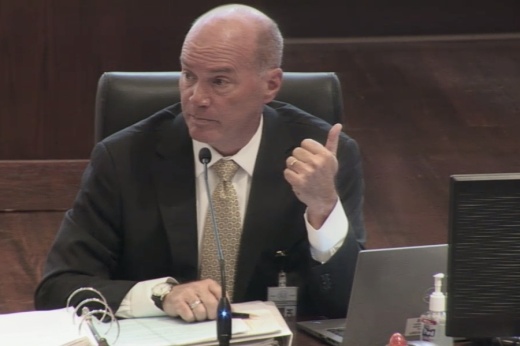Bexar County’s newly adopted $2.86 billion budget for fiscal year 2022-23—the final budget overseen by outgoing County Judge Nelson Wolff—will be supported by an unchanged property tax rate and includes 12 new sheriff’s deputy positions.
County commissioners voted unanimously Sept. 13 to pass the budget, which takes effect Oct. 1. It contains a recent $1.06 million increase to fund 12 deputy officer positions and two sheriff’s deputy sergeant positions.
The 14 new law enforcement positions fall short of 76 positions that Sheriff Javier Salazar proposed to boost his agency’s efforts to improve emergency response times, especially in fast-growing parts of west Bexar County.
In a Sept. 6 budget workshop, the commissioners court heard from nearly 60 speakers, many of whom work for the sheriff’s department, are former local law enforcement officers and are supporters calling for increased funding to create more sheriff patrol positions.
The result of another recent proposal, the new budget includes the unfreezing and funding of 19 booking and processing clerks, office assistants and security monitors at the Bexar County Adult Detention Center to permit deputies to leave office duties and return to street patrols.
Wolff said the final budget adjustments related to law enforcement will help the sheriff’s deputies to better deal with issues in unincorporated portions of Bexar County where residents have had to rely on aid from their nearest suburban or school district police agencies.
“The court is doing something to emphasize more protection for citizens out in the unincorporated areas,” Wolff said.
The new budget also has funding to hire one security guard for the Juvenile Justice Academy, an east San Antonio alternative school that will now have two law enforcement personnel to better work hand in hand with teachers and students on the ground.
Additionally, the budget features $1.52 million to create 17 new positions that District Attorney Joe Gonzalez requested as a means to increase his staff to help better review video evidence and enable lawyers to meet with crime victims.
The budget also features a 5% pay table increase for all county employees, $716 million in capital projects and $628,705 for five new positions to help address an increasing workload in the county medical examiner’s office.
The total budget is higher than the $2.39 billion adopted by commissioners for fiscal year 2021-22, county officials said.
Commissioners approved the county sticking with the property tax rate of $0.29 per $100 valuation. County Manager David Smith said Bexar County will continue to see a stable revenue flow due to increasing property appraisals, including a 27.8% rise in single-family home values.
The new budget does reflect some property tax relief in the form of a 20% homestead exemption, which county officials said will save the average Bexar County homeowner $96 on their tax bill annually.
Wolff commented on the commissioners court’s passage of the 21st and final county budget he has overseen as county judge. Wolff plans to retire from public office at the end of his term at the end of this year.
“I think we made headway. A lot of exciting things are in the budget,” Wolff said.
Wolff said the new property tax relief will particularly help many local homeowners.
“It’s a very significant move that will make a big difference for people who want to stay in their home or make an investment and improve their home,” he said.
Smith reminded Wolff that commissioners approved his first budget as county judge on Sept. 11, 2001, the same morning terrorists struck the World Trade Center in New York City and the Pentagon in Washington, D.C. Smith said the county budget adopted that day totaled nearly $550 million.
“I remember that day. It was the shortest commissioners court meeting in our history,” Wolff said.
Precinct 4 Commissioner Tommy Calvert said Wolff has guided Bexar County through many changes, including ensuring its budget and finances keep pace with growth across the San Antonio area.
“You should be proud of those 21 years. Some things have been done incrementally; some things have been done in huge leaps,” Calvert said.





